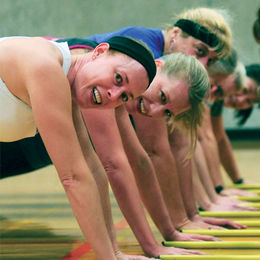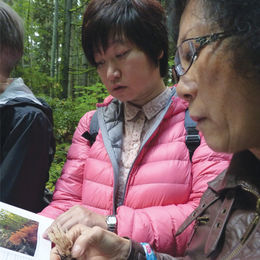
Bellevue Parks & Community Services, nationally accredited since 2005, operates an extensive array of recreation programs. However, the City of Bellevue is far from alone in the provision of recreation activities. Many Bellevue residents have access to a wide variety of recreational opportunities offered by other public agencies, private non-profit organizations, and private for-profit companies. Recognizing that Parks & Community Services is one provider among many, the Recreation Program Plan defines the City of Bellevue’s role as a recreation provider within this system. The plan establishes a set of core goals for Parks & Community Services and sets a pricing policy (see Appendix IV: Recreation Program Pricing Policy) to guide the investment of public resources in support of recreation programs.
Department programs and events offer important opportunities for community members to connect with one another, especially as the city grows and becomes increasingly diverse. In 2022, the citywide population was estimated at 153,900, with non-white residents comprising 50 percent of the population and 41 percent of residents born outside the United States (see Appendix I: Bellevue Community Profile). By comparison, the U.S. Census of 2000 documented a population of 109,827, with 28.3 percent non-white residents, and 25 percent born outside the United States. Between 2000 and 2010, foreign-born residents comprised about 107 percent of Bellevue’s population growth. Between 2010 and 2019, foreign-born residents represented 73 percent of the city’s growth.
Given the diverse and changing needs of Bellevue’s residents, one of the department’s key roles is to offer accessible, equitable, and inclusive programs and services, providing a safe and gracious space where the entire community can connect with one another.
Recreation program participants in Bellevue consistently give the city high marks for both the quality and type of offerings. The department regularly conducts a recreation user survey to document participant feedback about programs. In 2022, 95 percent of participants rated programs good or above and 97 percent indicated they would recommend Parks & Community Services programs to others. In a representative sample survey of Bellevue residents taken in 2021, 94 percent of respondents report satisfaction with Bellevue’s parks and recreation activities.
The Recreation Program Plan works in concert with other key Parks & Community Services documents, including the Parks and Open Space System Plan and the Human Services Needs Update, to convey the department’s role in providing parks, recreation, and community services to Bellevue residents. The Parks and Open Space System Plan guides the long-term growth and development of Bellevue’s parks and open space system and serves as the department master plan for facilities. The Parks and Open Space System Plan contains the Community Inventory and can be found on the City of Bellevue website at www.bellevuewa.gov/park-plan.
The policy bases for these functions are established in the City of Bellevue Comprehensive Plan, as well as department-specific plans including Parks & Community Services Strategic Plan and Parks & Community Services Diversity Strategic Plan. The Parks & Community Services Diversity Strategic Plan aims to identify and implement strategies that create an equitable culture of inclusion and belonging for staff, participants, and the community. The plan is referenced within this Recreation Program Plan as a policy basis for making recreation programming more inclusive and culturally relevant.
To provide program-level analysis and short-term strategic direction, Parks & Community Services maintains a series of program plans focused on specific population groups, facilities, or programs (for example the Choices for People with Disabilities plan). These plans are updated as necessary to maintain a nimble, relevant, and effective response to ever-changing community needs.
Core to the planning process is a series of program proposals that are drafted every two years for funding consideration through the City of Bellevue’s budget process. These proposals are derived from higher-level planning documents and include performance measures that are continually tracked for evaluation purposes.
This Recreation Program Plan is structured to progress from the general to the specific. The opening sections discuss the role that recreation plays in the community and the nature of Bellevue’s existing recreation system, including community perceptions of current recreation opportunities. This is followed by a discussion of the vision and principles that have guided the development of this plan. The next section describes overarching goals for Bellevue’s involvement as a recreation provider. Finally, the document outlines actions that will be undertaken to implement these policies.
Purpose and Philosophy of Recreation
Recreation and the use of leisure time have long been considered an integral part of both individual and community well-being. In the United States, the public sector became heavily involved in recreation as the country became increasingly urbanized during the 19th and 20th centuries. Since that time, public sector recreation has evolved through four stages:
- Regaining natural settings in urbanized areas in order to allow people, mostly youth, to engage in play (recreation) activities that mimic those available in rural settings;
- Providing safe activities that improve the physical, intellectual, and civic life of urban residents;
- Meeting consumer demand for specific recreation activities and services; and, finally,
- Providing geographically distributed access to parks, open space, and other facilities that can be used for whatever recreation purpose individuals find enjoyable and practical.
Governments reassessed their role in service delivery beginning in the late 1990s, and since then public recreation agencies have taken a more holistic view of service provision. They are now providing access to recreation in ways that tap the full capacity of a community’s public and private recreation resources. This involves close collaboration with other city departments, public agencies, schools, and private and non-profit organizations to provide equitable access to recreational opportunities community-wide.
The National Recreation and Park Association (NRPA) describes the role of park and recreation agencies using three pillars: Health & Wellness, Conservation, and Social Equity. Together, these pillars articulate current values and approaches to park and recreation services, acknowledging that community health and wellness are inextricably linked to protecting open space, engaging communities with nature, and ensuring that all people have access to these benefits and opportunities.
Today, Bellevue’s recreation services reflect the legacy of these philosophies. The city’s delivery model of recreation and leisure service provision is based upon individual health and well-being, building community connections and resilience, and environmental stewardship. While recreation in general provides an opportunity for personal choice and individual expression or development, Bellevue’s programs and services further focus on exploring and cultivating the full richness of community diversity through social interactions. Program staff research and create recreational activities that support both individual and community well-being.
A clear understanding of the conceptual foundations of parks and recreation informs the department’s program offerings. Leisure and recreation are associated with positive experiences of freedom, learning, mental and physical development, companionship, and creativity. Leisure time can be a respite from stress, provides a venue for rest and relaxation, and creates opportunities for “re-creation” by restoring depleted energies. The importance of play has also become increasingly evident as a means to enhance individual and collective health for all ages. Engaging in play has been demonstrated to reduce multiple health and social ailments.
As a recreation provider in an urban setting, Bellevue Parks & Community Services also recognizes the importance of connecting all residents to the natural environment through its programs, parks, and facilities. By providing recreational, educational, and service-learning opportunities that are close to home, the department facilitates lifelong connections to the natural world and inspires future generations of environmental stewards.


